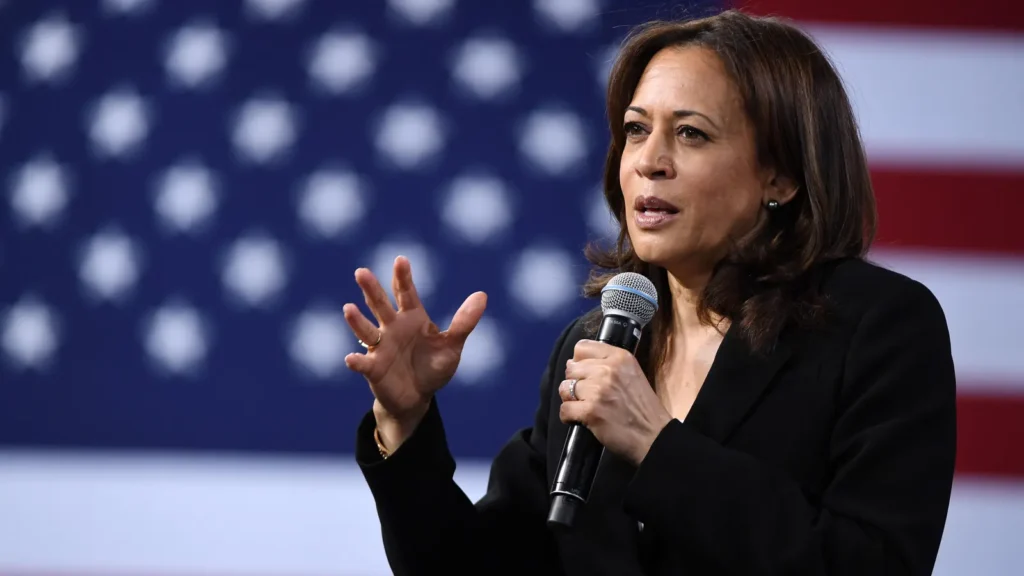The cryptocurrency community is buzzing with speculation and concern following Vice President Kamala Harris’s proposal for a 25% tax on unrealized capital gains. Many fear this bold fiscal policy could lead to a significant sell-off in the crypto markets, potentially destabilizing prices and impacting investors of all sizes.
Understanding the 25% Unrealized Gains Tax Proposal
Kamala Harris’s proposed tax plan aims to transform how the U.S. tax system addresses asset appreciation. The key change? A 25% tax rate on the unrealized gains of Americans whose net worth exceeds $100 million. This means high-net-worth individuals would be taxed not just on the profits they make when they sell their assets, but on the appreciated value of their holdings, even if they haven’t sold them.
This proposal is part of a broader economic strategy by the current administration, intended to address income inequality and ensure the wealthiest pay their fair share. While the goal is to generate revenue and address imbalances in the tax system, the impact on investment strategies—especially within the volatile crypto market—could be severe.
Why It Matters for the Crypto Industry
Cryptocurrencies are a unique asset class, known for their extreme volatility and potential for long-term appreciation. Investors, both large and small, often follow a “HODL” (Hold On for Dear Life) strategy, betting on exponential growth over extended periods. With Harris’s proposed tax, however, this strategy could be upended.
The proposed unrealized gains tax would force high-net-worth investors to pay taxes on the value of their crypto holdings before they’ve actually sold them. This could trigger a wave of selling, as investors seek to liquidate assets to cover massive tax bills. For example, early Bitcoin investors like the Winklevoss twins, who bought BTC at around $10 per coin, could face a tax bill approaching $1 billion. Similarly, Tim Draper, an early Bitcoin adopter with purchases at around $632 per coin, might be staring at a $423 million tax demand.
Such heavy tax burdens could lead these investors to offload large portions of their portfolios, flooding the market with sell orders. This increased supply would likely depress cryptocurrency prices, triggering a cascade of sell-offs as other investors rush to exit the market before prices plunge further.
Zac Townsend Sounds the Alarm
Zac Townsend, CEO and co-founder of Meanwhile, is among the most vocal critics of the proposal. He argues that taxing unrealized gains deviates sharply from traditional tax norms, which have typically targeted realized gains—profits that are locked in when assets are sold. Townsend believes the proposed tax would distort market dynamics, force premature sales, and lead to widespread market disruption.
“Investors could be compelled to sell off large portions of their portfolios just to meet their tax obligations,” Townsend warns. “This would create significant downward pressure on asset prices, particularly in the highly sensitive and speculative crypto markets.”
Townsend also highlighted the potential for increased volatility as the new tax policy shifts investor behavior. With long-term holding strategies becoming less appealing, more investors may turn to short-term speculation, further destabilizing already volatile markets.
Ripple Effects: Market Volatility and Investment Flight
The ripple effects of Harris’s tax plan could extend far beyond the cryptocurrency community. If large-scale investors are forced to sell their crypto assets, it could impact other financial markets, including equities and real estate, as these investors might need to liquidate a variety of assets to meet their tax obligations.
Moreover, the tax could discourage future investment in the United States. Crypto entrepreneurs, already frustrated by the lack of regulatory clarity, might opt to move their operations and investments offshore to avoid burdensome taxation. This would weaken the U.S.’s position as a global leader in digital asset innovation, potentially stifling growth and job creation in the sector.
Political Implications: A Battleground Issue
Kamala Harris’s tax proposal has already sparked a fierce political debate, and its timing couldn’t be more crucial. The 2024 U.S. presidential election is looming, and Harris is currently neck-and-neck in the polls with former President Donald Trump. The proposed tax plan has become a focal point in the election campaign, with the cryptocurrency community showing a clear preference for Trump’s more laissez-faire stance on financial regulation.
Analyst Eric Balchunas recently suggested that a Trump victory could have far-reaching implications for the crypto industry, potentially influencing the fate of Bitcoin, XRP, and Solana ETFs. If Trump wins, he might seek to roll back Harris’s tax proposals and introduce more industry-friendly policies, which could revive investor confidence and trigger a rally in crypto markets.
For now, however, the uncertainty surrounding Harris’s plan is adding to the anxiety in the market, contributing to increased volatility as investors try to position themselves ahead of potential policy changes.
What’s Next?
In October, Harris is expected to host a roundtable discussion on crypto policy, providing a platform for industry leaders to voice their concerns and potentially shape the future regulatory landscape. Many in the industry are hoping for more balanced and inclusive policies that address the needs of both investors and regulators.
But for now, the fear of a major crypto market sell-off looms large. If Harris’s 25% unrealized gains tax is implemented, it could mark a turning point for the U.S. crypto market—one that could lead to a period of unprecedented volatility and uncertainty.
Final Thoughts
Kamala Harris’s 25% unrealized gains tax proposal is shaking up the cryptocurrency world, sparking fears of a massive sell-off that could send shockwaves through the market. As political uncertainty and regulatory challenges mount, the crypto community is bracing for a potentially turbulent period. Whether or not the proposal ultimately becomes law, the debate surrounding it highlights the urgent need for clearer, more predictable crypto regulations that can support both innovation and investor protection.
QUEEN WHALE
Views: 1




